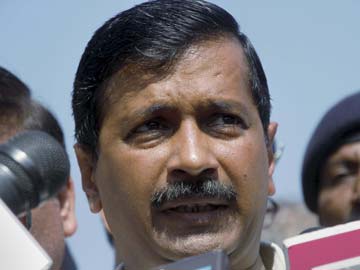 New Delhi, Apr 8: Undeterred by repeated attacks on him, Aam Aadmi Party leader Arvind Kejriwal today stuck to his stand of not accepting security.
New Delhi, Apr 8: Undeterred by repeated attacks on him, Aam Aadmi Party leader Arvind Kejriwal today stuck to his stand of not accepting security."I don’t need any security. I have written to police several times, but still you see some policemen surrounding me. They are there despite my writing. I can't remove them, but I don't need security," Kejriwal said at a press conference here.
The AAP leader was slapped by an auto driver today at Sultanpuri during a roadshow to garner support for North-west Delhi candidate Rakhi Birla. This was the third attack on him in less than a fortnight.
He also slammed the police for not investigating the attacks. When asked why he was not approaching the police to look into the matter, he said, "In the last attack (in Dakshinpuri) the police said he was a disgruntled AAP worker".
"When our workers visited his residence, his father said that he was hardly interested in politics and had got an AAP cap two days back. So what should we tell the police. They are aware of everything."
Kejriwal said that those who have attacked him were "victims" of the system, mostly the umemployed youth who were carrying out the task at the behest of someone else.
"I forgive all of them. They are also victims of the system. Reports have come from few places that they are unemployed youth who are being used," he said.
Kejriwal said that though the attack was carried out by few young men, after being caught they read out someone else's script.
"Those who attacked me in Delhi said that they did so because I did not fulfil the promises made. But we did not make any promise in Varanasi, Gujarat and Haryana. So why were we attacked there?" he said.
The AAP leader said that attacks on him are a part of a larger conspiracy and questioned why were these acts only carried out against his party.
"Questions arise in my mind on who is the mastermind behind these attacks. Is it one person or there are many? What are they going to achieve from this? I am not able to understand this.
"This is a do-or-die situation. Why do these parties attack only us and not other parties. In future, we will also have more dangerous attacks and we have to be ready to face it," Kejriwal said.
"If they think that beating me can solve the problems of the country, then they can let me know the place and time. I will come there all alone and they can beat me as much as they want," he added.
After the attack, Kejriwal also visited Rajghat and sat there for over an hour along with other AAP leaders and his followers.
"I went to Rajghat, as Gandhiji was a disciple of truth and non-violence, and pray for strength. We are going through a tough time, I prayed for patience and capability to complete this mission," he said.






Comments
Add new comment